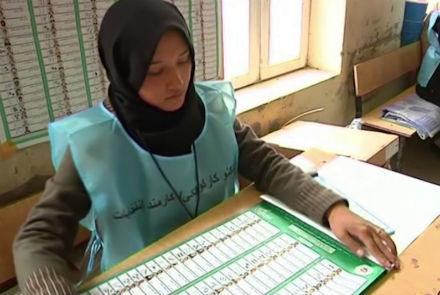Documents seen by TOLOnews indicate that over one billion dollars have been spent on the elections in Afghanistan over the past one decade.
The documents show that the financial expenditures of every election have been less than the previous poll, but the lvel of challenges facing the elections have noticeably increased.
Meanwhile, the Independent Election Commission (IEC) has said that there is a need for $120 million financial expenditures for the next parliamentary and district council elections in Afghanistan.
“They (donors) have some reservations that the money is spent on holding the elections in transparent manner so that satisfaction of the people of Afghanistan is achieved,” said IEC commissioner Maazullah Dawlati.
Large part of the amount raised to Afghanistan by the international community for elections have been invested on the training of the IEC employees, capacity building programs among IEC employees, construction of IEC offices and buildings and IEC stocks.
$449 million spent on elections in Afghanistan between 2003 and 2005 while this figure is around $370 million between 2008 and 2010.
$223 million spent on elections between 2014 and 2016
“The electoral reforms and finally continued and regular works on the utilization of technology in the upcoming elections, such as parliamentary elections and presidential elections in the future, major and bold steps have been taken in this regard,” said Abdullah.
From the total amount of money allocated for the elections in Afghanistan, so far 13 percent of the amount have been transferred to the account of UNDP in exchange of the logistics and transportation services provided by this institution, but keeping in mind that the UNDP has been one of the key supporters of elections in Afghanistan.
Afghan officials argue that the allocation of this amount of money is huge and insists that only two percent of the money should have been allocated for the logistics and transportation services.
In addition, observers and election monitoring groups have said that the lack of budget to fund the elections in Afghanistan could leave negative impacts on the transparency of elections in Afghanistan.
“First we have the election process and the preparations for the parliamentary and district council elections, it is natural these processes need financial resources, there is a dire need for the budget to implement the process and then conduct the elections,” said member of Election and Transparency Watch Organization Habibullah Shinwari.
Alongside tens of other promises made by the leaders of National Unity Government (NUG), rolling out the digital national identity cards and election reforms were also the top of the promises. However NUG leaders have been under severe criticisms over their failure to deliver on their commitments.
Observers say that the NUG failure to deliver on the promises has been a key reason behind the reluctance by the donors to fund the elections in the country.


